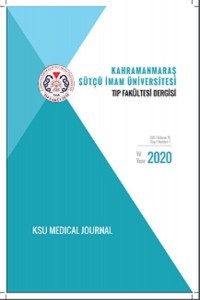Acil Servise Epilepsi Nöbeti ile Başvuran Hastalarda Hematolojik ve Biyokimyasal Parametrelerin Değerlendirilmesi
Epilepsi nöbeti, Acil servis, Hemogram, Biyokimya, Prolaktin
Evaluation of Hematological and Biochemical Parameters in Patients Presenting to the Emergency Department with Epileptic Seizure
Epileptic seizure, Emergency department, Hemogram, Biochemistry, Prolactin,
___
- Balal M, Demir T, Bozdemir H. Birinci basamak sağlık hizmetlerinde epileptik nöbet ve non epileptik psikojen nöbet ayırıcı tanısı. TJFM&PC, 2016;10(2):105-108.
- Arıkanoğlu A. Epileptik nöbet ve psödonöbet ayırıcı tanısı. Klinik ve Deneysel Araştırmalar Dergisi 2011;2(3):330-334.
- Çakıl D, İnanır S, Baykan H, Aygün H, Kozan R. Epilepsi ayırıcı tanısında psikojeniknon-epileptik nöbetler. Göztepe Tıp Dergisi 2013;28(1):41-47.
- Bodde NM, Brooks JL, Baker GA, Boon PA, Hendriksen JG, Mulder OG et al. Psychogenicnon-epileptic seizures-definition, etiology, treatment and prognostic issues: A criticalreview. Seizure 2009;18(8):543-553.
- Ioannis KA, Georgia D, Montouris B, Charitomeni PC, Marta SLD, Kimford J et al. Patient and care giver quality of life in psychogenicnon-epileptic seizures compared to epileptic seizures. Seizure 2014;23:47–54.
- Yoldas MA, Hanci F, Dincel GK, Bekdas M. The predictive role of neutrophil-to-lymphocyte ratio and platelet-to-lymphocyte ratio in children with simple febrile seizures. Exp Biomed Res 2021;4(3):198-205.
- Güneş M, Büyükgöl H. Relationship between generalized epileptic seizure and neutrophil/lymphocyte ratio, platelet/lymphocyte ratio, and neutrophil mediated inflammation. Int J Neurosci. 2020;130(11):1095-1100.
- Hosseini S, Mofrad AME, Mokarian P, Nourigheimasi S, Azarhomayoun A, Khanzadeh S et al. Neutrophil to lymphocyte ratio in epilepsy: A systematic review. Mediators Inflamm. 2022;2022:4973996.
- Chen DK, So YT, Fisher RS. Use of serum prolactin in diagnosing epileptic seizures: Report of the Therapeutics and Technology Assesment Subcomittee of the American Academy of Neurology. 2005;65:668-675.
- Eroglu T, Aydin Turkoglu S, Bolac ES, Yıldız S, Yıldız N. Hemogram parameters in epilepsy may be indicators of chronic inflammation and hypoxemia. J Neurol Clin Neurosci. 2017;1(1):17–20.
- Gontko-Romanowska K, Żaba Z, Panieński P, Steinborn B, Szemień M, Łukasik-Głębocka M et al. The assessment of laboratory parameters in children with fever and febrile seizures. Brain Behav. 2017;7(7):e00720.
- Kiviranta T, Airaksinen EM. Low sodium levels in serum are associated with subsequent febrile seizures. Acta Paediatr. 1995;84(12):1372-1374.
- Zifman E, Alehan F, Menascu S, Har-Gil M, Miller P, Saygi S et al. Clinical characterization of gastroenteritis-related seizures in children: impact of fever and serum sodium levels. J Child Neurol. 2011;26(11):1397-1400.
- Karceski S. Acute symptomatic seizures and systemic illness. Continuum (Minneap Minn). 2014;20:614-623.
- Costea RM, Maniu I, Dobrota L, Neamtu B. Stress hyperglycemia as predictive factor of recurrence in children with febrile seizures. Brain Sci. 2020;10(3):131.
- ISSN: 1303-6610
- Yayın Aralığı: Yılda 3 Sayı
- Başlangıç: 2004
- Yayıncı: Kahramanmaraş Sütçü İmam Üniversitesi
Yılmaz İNANÇ, Celaleddin TURGUT, Tuğba KAYA
Obezitede İnflamasyon ve İnsülin Direncine Etkili Hematolojik ve İnflamatuar Parametreler
İlkokul Öğretmenlerinin Obeziteye Karşı Önyargı Durumları ve İlişkili Faktörler
Uğur LÖK, Umut GÜLAÇTI, Hüseyin KAFADAR, Hakan KAYA
Hashimoto Tiroidit’i ile Papiller Tiroid Karsinom Birlikteliği ve Prognoza Etkileri
Caner ÖLMEZ, Mehmet Kutlu DEMİRKOL, Muhammed SEYİTHANOĞLU, Sezen KOÇARSLAN, Faruk KÜÇÜKDURMAZ, Sefa RESİM
Üriner Sistem Taşlarının Kimyasal Bileşiminin Yaş ve Cinsiyete Göre İncelenmesi
Eda GANİYUSUFOĞLU, Metin KILINÇ, Sefa RESİM, Buket ŞEN, Hatice SAĞER
Hipertansiyon Rozasea Hastaları İçin Risk Mi?
Ünal ÖZTÜRK, Savaş ÖZTÜRK, Emin ÇEÇEN
Akromegali Hastalarında Hematolojik İndekslerin Değerlendirilmesi
